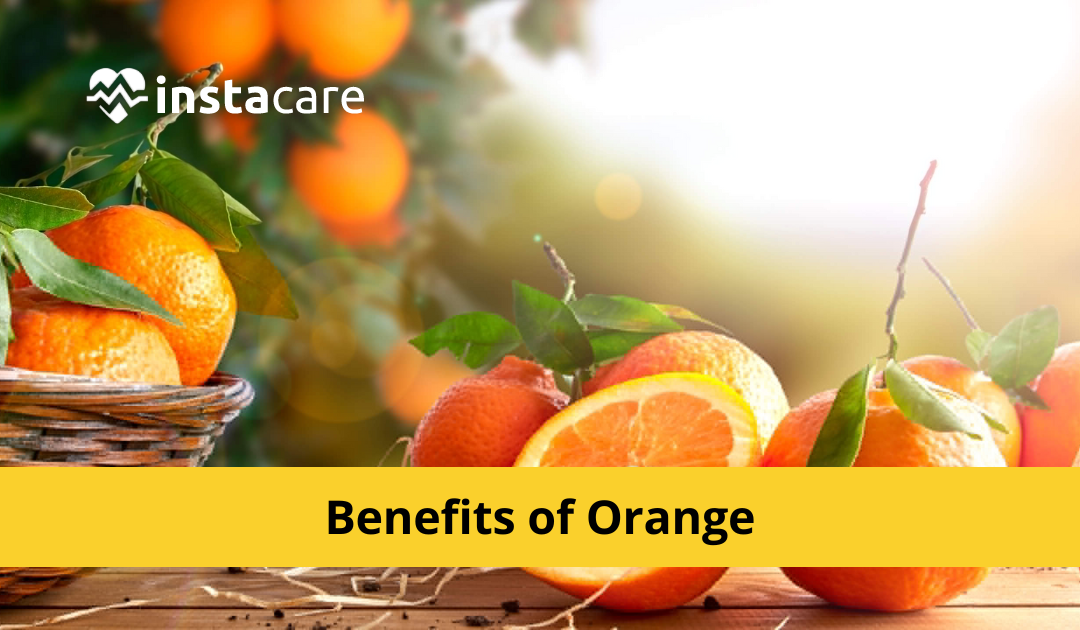Oranges are common citrus fruit, so if you like them, you've probably had your fair share.
The sweet orange, or citrus sinensis, is the variety most people consume, fresh and in juice form.
Since its beginnings, thousands of years ago in China, sweet orange trees have spread around the world, including the United States, Mexico, and Spain.
Vitamins, minerals, and antioxidants are just a few of the nutrients and beneficial plant chemicals in oranges. According to studies, eating oranges may have various positive health effects.
Everything you need to know about Oranges: Nutrition, potential health benefits, and more are covered in this article.
Benefits Of Orange Consumption
Vitamin C-Rich
An excellent source of vitamin C is oranges. One orange contains 116.2% of the recommended daily intake also of vitamin C. Because vitamin C helps to eliminate free radicals that harm our DNA, it has been linked to also a lower risk of colon cancer.
A Strong Immune System
Vitamin C helps prevent colds and reoccurring ear infections and is essential for the correct operation of a healthy immune system.
Stops Skin Damage
Oranges include antioxidants that help shield the skin from free radical damage, which is believed to cause aging symptoms. Even at 50, eating an orange a day might keep you looking young!
View More: 7 Amazing Chikoo Fruit Benefits
It helps Control Blood Pressure
The presence of magnesium in oranges, along with the vitamin B6 they are high in, supports the production of hemoglobin and helps to control blood pressure.
Brings Down Cholesterol
Researchers from the US and Canada found that a class of chemicals called Polymethoxylated Flavones (PMFs) found in citrus fruit peels may be able to lower cholesterol more effectively and without adverse side effects than some prescription medications.
Promotes Iron Absorption
Citrus fruits are essential for the body's regular operation since they aid in iron absorption. Citrus fruits have long been advised to people who are anemic by doctors. When the body doesn't have enough of the mineral iron necessary for it to operate, anemia results. Oranges contain a lot of vitamin C, essential for iron absorption, even though they are not a vital source.
Promotes Heart Health
If oranges are correctly taken, their nutrients lower the risk of heart disease. One of the leading causes of also early death worldwide is heart disease. Oranges are associated with good heart health because they can control blood cholesterol levels, a factor in most heart diseases.
Regulates The Blood Sugar Level
Oranges are a healthy snack for people with diabetes because of the fiber in them, which helps to control blood sugar levels. Oranges also contain simple sugars. Fructose, a natural fruit sugar found in oranges, may prevent excessively high blood sugar levels after meals. It has a glycemic index of 40, and typically, foods with glycemic indexes under 50 are regarded as having low sugar content. That means that you should consume only a few oranges at a time. Overeating can increase insulin levels and potentially cause weight gain.
Reduces The Chance Of Cancer
Oranges include D-limonene, a substance that has been shown to protect malignancies like breasts, skin, and lungs. Oranges contain antioxidants and vitamin C, crucial for boosting immunity and preventing cancer. The fruit is anti-cancer because of its fibrous composition. According to research, up to 15% of cancer cases are caused by DNA abnormalities that Vitamin C can help stop.
Optimal Eye Health
A great source of carotenoids is oranges. They are essential for maintaining the health of the mucous membranes in the eyes because they contain vitamin A. In severe cases, age-related macular degeneration, which is prevented by vitamin A, can result in blindness. It also aids in light absorption by the eyes.
Oranges: Nutrition
The nutritional breakdown for one orange (140 grams) is shown below (3 Reliable Sources):
- 66 calories
- 86% of the total is water
- 1.3 grams of protein
- 14.8 grams of carbs
- 12 grams of sugar
- 2.8 grams of fiber
- 0.2 grams of fat
- 92% of the daily value for vitamin C (DV)
- 9% of the DV for folate
- 5% of the DV for calcium
- 5% of the DV for potassium
Oranges, like most fruits, are primarily composed of carbohydrates and water, have very little protein and fat, and have a low-calorie count.
Conclusion
Juice oranges while at room temperature because they, like most citrus fruits, provide more juice when they are warmer. More juice can be extracted by rolling the orange under your palm on a flat surface. Once an orange has been cut up, consume it quickly because vitamin C degrades when exposed to air.
Please book an appointment with the best Nutritionist in Lahore, Karachi, Islamabad, and all major cities of Pakistan through InstaCare, or call our helpline at 03100002273 to find a verified doctor for your disease.
Source: https://instacare.pk/blog/oranges-benefits-and-nutrition











